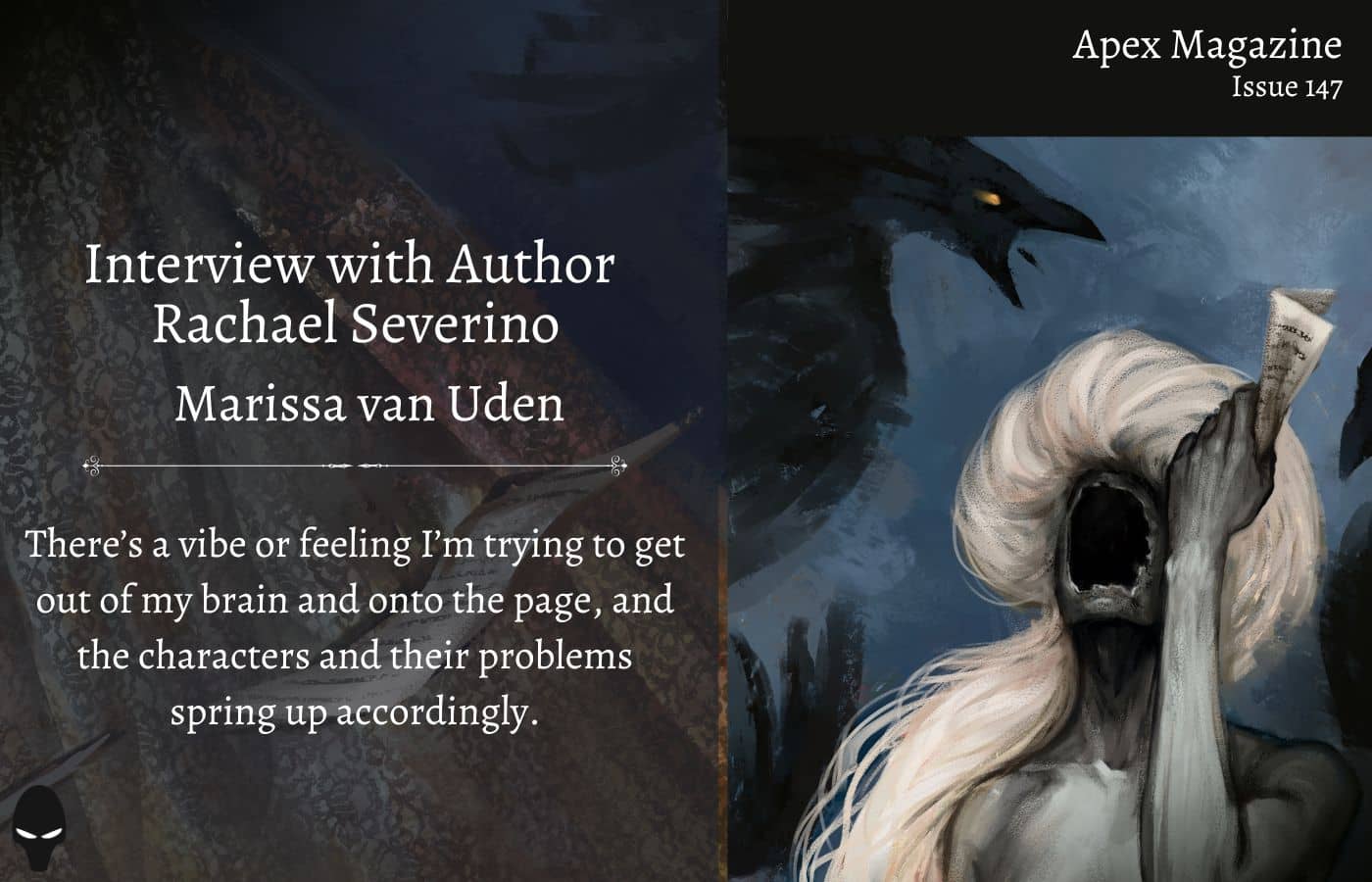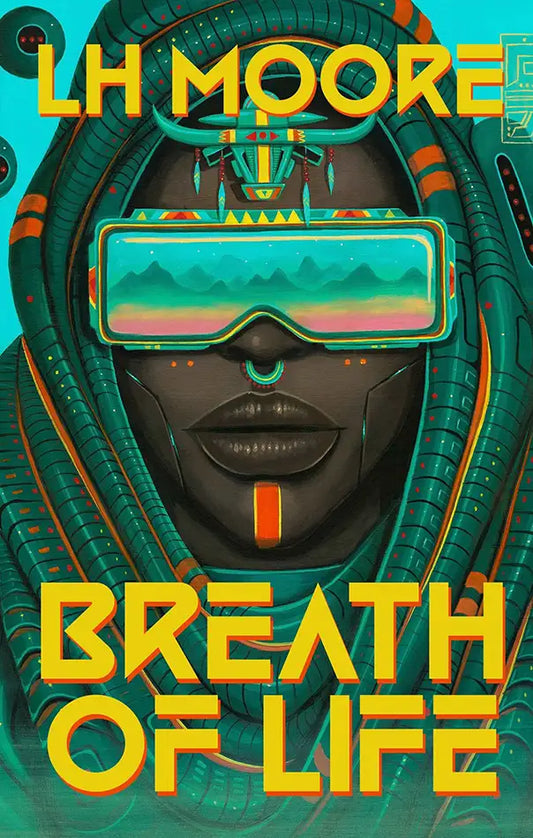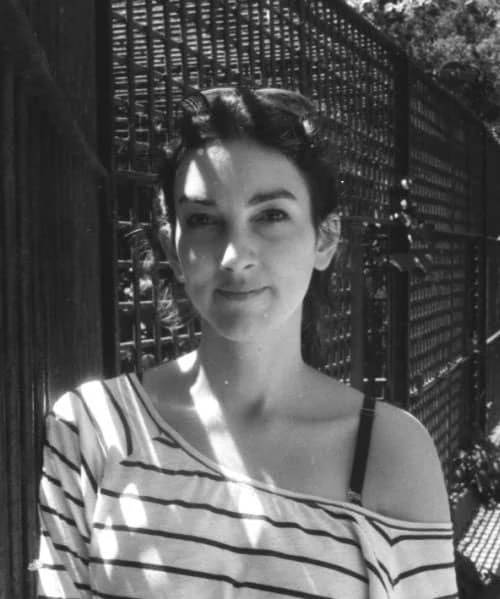
In “Birds of a Feather,” the youngest son in a rather strange family is aware of mysterious happenings and disappearances around the home. When he learns that his sister is to marry and move away, he is desperate to go with her. Sure she might be rather terrifying at times, and she might make him retch when he sees what she does to birds, but she is the only one who can protect him from the outside world and the expectations it imposes. His sister promises to take him with her, but only if he can prove that he too can read entrails and divine secrets, an ability that belongs to only women. He is determined to go with her and so must prove he can read too, but doing so might mean learning about what’s really going on at the house.
Rachael Severino is a writer from New York. She is completing her MFA at Columbia University. She is a fan of all things weird.
Marissa van Uden: Thank you for sitting down with us to discuss this utterly creepy “family tale”! I’m pretty sure I said the words “holy shit” aloud at least three times while reading this. It’s so twisted and dark, and the family is so strange that I could never quite tell which way it was going to go. To start with, can you tell us a bit about what inspired this story and how it took shape from there?
Rachael Severino: Thank you, thank you! And yes, I was working off an image I had in my head that informed most of the first scene between the narrator and his sister. I could see a girl sitting on a windowsill, luring a bird to her, and abruptly killing it. A very sweet moment turned sour. I wrote the original draft a few years ago and then spent the next year telling myself I would get around to fixing the kinks. When I finally picked the story back up, I rewrote basically everything except that first scene.
MVU: One thing that really struck me was how vivid and atmospheric this story is. Right from the very first page, I felt like I was literally in this place with the youngest brother, with every sense heightened. It just feels rich. Is the atmosphere and setting something you really focus on while writing? And when does that part happen—do you hit most of those notes in the first draft as the story plays out in your mind, or do you get the meat and bones of the story down first and then begin fine-tuning the scenes for atmosphere and mood and verisimilitude?
RS: That’s very sweet of you! For me, the atmosphere and general tone of the story are usually one of the only things I have when I sit down to write. Working in tandem with the image of the sister in the first scene, I really wanted to get across this feeling of being hunted and constantly on edge. There’s a vibe or feeling I’m trying to get out of my brain and onto the page, and the characters and their problems spring up accordingly. Unfortunately, this usually means my first drafts are rather gelatinous; no plot, all vibes.
The setting is actually kind of funny. I had a totally different backdrop in the first draft, but because I waited so long to edit, I was bored with the setting by the time I went back.
MVU: Gelatinous first drafts! I love this way of putting it.I found the sister in this story particularly fascinating to read: I was horrified but couldn’t look away. The relationship dynamics between her and the youngest brother only added to the strangeness and quickly subverted any expectations I had. What scene was the most fun to write with these two, and which was the most challenging?
RS: Yeah, she’s a treat, isn’t she? I really liked the scene where she’s trying to see if the narrator can “read.” It’s my favorite, but it was also the most frustrating to get right. I probably only like it now because I don’t have to edit it anymore. Writing that scene felt like a juggling act. The narrator is so all-over-the-place panicked, because of the gore and because of his sister, who has framed his success as necessary for keeping him safe. I was also trying to keep the interpretation of what they’re doing open, where the “reading” could be supernaturally obtained knowledge, or it could be him putting together things he’s seen around the house and repressed. I have my opinions on which it is, though. And of course, there was the sister herself. She’s rather impenetrable, because the narrator doesn’t understand her. She’s violent and cold, but not wild. She’s a very precise person, but her actions don’t make any sense to the narrator for a laundry list of reasons. Having her exist through the lens of the narrator was always going to distort her, but because it’s such an emotionally fraught scene, it was a two-hands-on-the-wheel deal trying to make sure I got her character right.
MVU: You’ve already written an absolutely hideous [complimentary] flash story, “Cuticle Oil,” for The Corvus Review, which I encourage any reader who loves body horror or squirming uncomfortably (and who doesn’t?) to go check out. I really love the narrator’s voice—the way she is so blase about everything works so perfectly with the surreal nature of her response to painful news. I’ll quote the opening lines here so readers can get a sense for what it’s about:
“I am a picker.
It’s not trichotillomania. That is hair specific and usually ascribed to women of a nervous
disposition. Any hack could tell you I’m … nervy, but I’m not all that interested in hair. I much
prefer skin.”
Can you tell us a little about this nightmarish little story: what inspired the idea, and is body horror a special love of yours?
RS: It was actually a prompt from one of my classes. Write a story where a character finds themselves in a shrinking environment. I thought it was clever to make the “shrinking environment” a literal body. I was pushing to see what my teacher would tolerate, I think. But my brain does frequently drift into body horror territory. Blood tends to make people extra squirmy; I noticed that when I was kid and making up stories to anyone who would listen. I’d like to think I’m doing a little more than just making my reader nauseous, though. That kind of violence usually leaves a character vulnerable, and I feel like I’m always writing about liars, so those moments are perfect for getting honesty out them.
MVU: I saw that you also review horror films at Collider. How did your love for horror films start—was this something you were drawn to even as a kid, or did you fall in love with the genre much later? What are your origins-story horror films: the ones that first drew you in and that you still watch or think about?
RS: Don’t let the job title fool you, I knew next to nothing about movies until recently. I just have a lot of opinions and really like horror, regardless of the medium. I did get into horror through films, though. When I was a kid and stayed with my grandmother, she’d leave the sci-fi channel on overnight—the one with all the really bad b-movies and special effects and the trashiest storylines. It’d be three in the morning and a woman would be on screen, getting eaten by a half-bug, half-human monster thing, and I was just obsessed. My grandmother was also crazy about crime shows, so I grew up watching a lot of Law & Order, CSI, and early seasons of Criminal Minds. The thriller aspect of those shows, and the mystery, was what really captured me. I keep telling myself I want to do a detective story, but who knows.
MVU: What horror films or books have you consumed recently that really excited you? And what was it about them that caught your attention?
RS: Oh a few! I devoured Sara Gran’s Come Closer this summer in basically one sitting. The voice of her narrator was so addicting. She’s so avoidant to her own demonic possession that plot points that should be traditional horror get recast in this neutral light. That’s something I’m really interested in, the relativity of horror. What’s terrifying and a worst-case-scenario to one person might be totally tolerable to another. I also finally read Brother by Ania Ahlborn. I’m so late to Ahlborn train, but I get it now! Reading that felt like watching a slasher. Another one I was late to was Nick Cutter’s The Troop. Of all the things that make me nervous, bugs are at the top of the list. I can’t remember another book that’s made me that squeamish.
MVU: That’s a great way to describe Come Closer. The narrator perspective in that one adds so many layers to the reading.Could you tell us a bit about your creative practice? Do you have a particular method for collecting and organizing ideas? Do you like to chew on a story idea for a while before beginning to write, or are you a discovery writer? Do you have a habitual writing routine or any rituals (music, favorite seat, animal companion, etc), or do you just chaos-write anywhere and anytime?
RS: I wish I had a routine, that’d be really nice—I’d probably get more done. I write at night and with music on, but that’s about as habitual as I get. There’s always a lead up process before I get to the page, kind of like a gestation period. There’s always a feeling or vibe I’m trying to get onto the page. Sometimes I have a particular voice or behavior that I build a character around, like with “Cuticle Oil.” Sometimes it’s an image like with “Birds of a Feather.” I’m almost always obsessed with a poem or song that I refer back to a lot during the first draft. It’s all very fragmented and scattered; it always needs to get worked out on the page. An outline would be smart, but I can never bring myself to write one. It’s just too many sticky note reminders that I end up losing around the apartment and in various purses.
MVU: What pieces of writing advice have really resonated with you personally and served you well?
RS: Time and space! Where are we in time and space? For any vibes-based writers trying to figure out how to inject some form of structure into their stories, orienting your character in a space and nailing down a timeline will do it every day of the week, I swear!
MVU: Ooh, that’s an excellent piece of advice, and something a little different! Before we wrap up, can you tell us about a charity that’s really meaningful to you, and that you’d love for readers to check out and support if they’re able to?
RS: The Michael Magro Foundation! My family has been involved with them for years and they do really beautiful community work. They support the families of children with cancer in basically every way you can imagine. They uplift and protect the children who are sick and the family members taking care of them.
MVU: Amazing, thank you for sharing that! And for taking the time to chat with us today about this brilliant story and your creative life. Do you have any new projects in the works that you’re able to share something about, or any upcoming publications that readers should look out for?
RS: Thank you! I just had a story out mid-September in Bloodletter Magazine, it’s called “Snake Charmer.” I’m working on a novel, but isn’t everyone? It’s a reverse haunted house.









